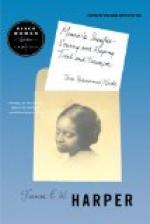The next cabin she entered was very neat, though it bore evidences of poverty. The woman, in referring to the past, told her how her child had been taken away when it was about two years old, and how she had lost all trace of him, and would not know him if he stood in her presence.
“How did you feel?” said Minnie.
“I felt as I was going to my grave, but I thought if I wouldn’t get justice here, I would get it in another world.”
“My husband,” said another, “asked if God is a just God, how would sich as slavery be, and something answered and said, ‘sich shan’t always be,’ and you couldn’t beat it out of my husband’s head that the Spirit didn’t speak to him.”
And thus the morning waned away, and Minnie returned calmer than when she had left. A holy peace stole over her mind. She felt that for high and low, rich and poor, there was a common refuge. That there was no corner so dark that the light of heaven could not shine through, and that these people in their ignorance and simplicity had learned to look upon God as a friend coming near to them in their sorrows, and taking cognizance of their wants and woes.
Minnie loved to listen to these beautiful stories of faith and trust. To her they were grand inspirations to faith and duty. Sometimes Minnie would think, when listening to some dear aged saint, I can’t teach these people religion, I must learn from them.
Refreshed and strengthened she returned home and began to work upon a dress for a destitute and orphaned child, and when night came she retired quite early, being somewhat wearied with her day’s work.
During his absence Louis had been among the freedmen in a new settlement where he had lately established a school, where, notwithstanding all their disadvantages, he was pleased to see evidences of growth and progress.
There was an earnestness and growing manliness that commanded his respect. They were beginning to learn the power of combination, and gave but little heed to the cajoling words, “We are your best friends.”
“Don’t you think,” Louis said to an intelligent freedman, “that the rebels are your best friends?”
“I’ll think so when I lose my senses.”
“But you are ignorant,” Louis said to another one. “How will you know whom to vote for?”
“Well if I don’t, I know how not to vote for a rebel.”
“How do you know you didn’t vote for a rebel?” said Louis to another one who came from one of the most benighted districts.
“I voted for one of my own color,” as if treason and a black skin were incompatible.




